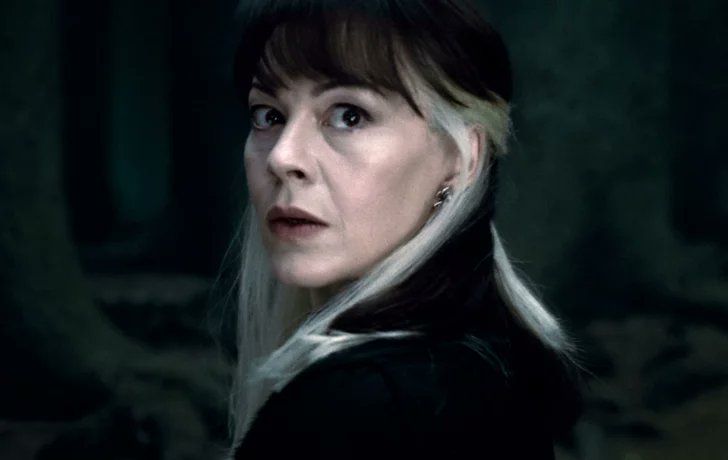What the Black Family Teaches Us About the Intricacies of Choice
The juxtaposition of societal privilege against moral ambiguity makes those in the Black family the most interesting characters in the entire franchise. There is nothing surprising about an inherently good and warm-hearted family like the Weasleys taking a righteous stance. In contrast, the Noble and Most Ancient House of Black passionately subscribes to every prejudice supported by the dark side.
The Blacks share many similarities. Yet their individual choices set them apart.

Bellatrix and Sirius are more alike than anyone else in their family. They are both driven by a crazed kind of passion and harbor a love for chaos. But above all, they are loyal to a fault.
Bellatrix truly believes in her family’s ideals and is fully committed to upholding them. However, her involvement in Voldemort‘s movement is entirely personal, born from an obsession with the man himself. She never tries to hide this fact and proudly expresses her devotion.
Sirius’s choices are heavily based on his admiration of James Potter, right from choosing Gryffindor to switching Secret Keepers. Sirius clearly idolizes James and tries to emulate him in every way. Although teenage James wasn’t the best influence, his upbringing and beliefs starkly contrasted the Black ideology. James provided Sirius with a bond unlike he had ever experienced. Knowing that he had the Potters to fall back on gave Sirius the strength to overtly reject his family’s beliefs and distance himself from them.
Sirius and Bellatrix teach us to be unapologetically ourselves. They make their own choices and stand firmly by their decisions. The only thing that sets them apart is whom they choose to be loyal to.
However, sometimes our doubts lead us to a realization that can change our entire perspective. This is something we learn from the lives of Draco Malfoy and Regulus Black. There’s a parallel between them – raised in comfort and privilege, obediently following their families’ legacy, and joining the Death Eaters at a very young age.
Draco had no one to counter his beliefs and practically grew up in an echo chamber. However, he soon realizes that saying nasty stuff and actually having the conviction to execute it are two completely different things. Under the Dark Lord’s constant surveillance and humiliation of his family, Draco retracts into a helpless shell of a boy. While his hesitation in identifying the golden trio is evidence of his doubts regarding the Dark Lord’s reign, he’s never one for bold rebellion.
Regulus’s uncharacteristic kindness toward Kreacher and his actions on realizing the Dark Lord’s true motives hint that he wasn’t one for blind conformity. Perhaps influenced by his rebel sibling, Regulus chooses to confront his suspicions instead of serving in ignorance. Had he survived, it’s unlikely that he’d have continued to serve the Dark Lord. Perhaps he’d have even sought out Sirius and switched sides.
Draco and Regulus demonstrate the effect that even a flicker of doubt can have on one’s choices. While Draco’s silent suffering brings forth the tendency of doubts to eat away at our conscience, Regulus’s defiance encourages us to rethink the beliefs we’ve been told to follow – no matter how long we’ve nursed them – and to have the courage to face the truth.

Then there’s the eternal power of love. No matter how different their lives are, the younger Black sisters are a reflection of one another. Coming from a household where ideals often mattered more than blood, both the sisters defy the norms by choosing love over tradition.
Andromeda‘s decision to leave her family to marry a Muggle-born and – later – to ally with the Order because of her daughter’s involvement are both born out of love and a need to protect the people she cares for.
But while Andromeda has been a “blood traitor” most of her life, Narcissa is the obedient daughter. She marries a pure-blood and continues the Black tradition by naming her son after a constellation. She endorses the pure-blood prejudices but never actively participates in Voldemort’s army. However, seeing the toll that the Dark Lord’s reign had taken on her family, Narcissa eagerly grabs the opportunity to free her family from this ordeal. At this point, who won the war did not matter to her at all.
Narcissa and Andromeda both show us the power of love and how it can be instrumental in diluting, if not eliminating, rigid ideals.
Sirius’s loyalty to James, Regulus’s conviction to find the truth, and Narcissa’s love for her family allow these Blacks to question their family’s ideals and rebel against them in their own way. They teach us that no matter where you were born, what you identify as, or who you have become, there is an opportunity to choose a different path for yourself in every moment. Ultimately, it’s these choices that tip the scale in favor of the light and lead to the downfall of the Dark Lord.


